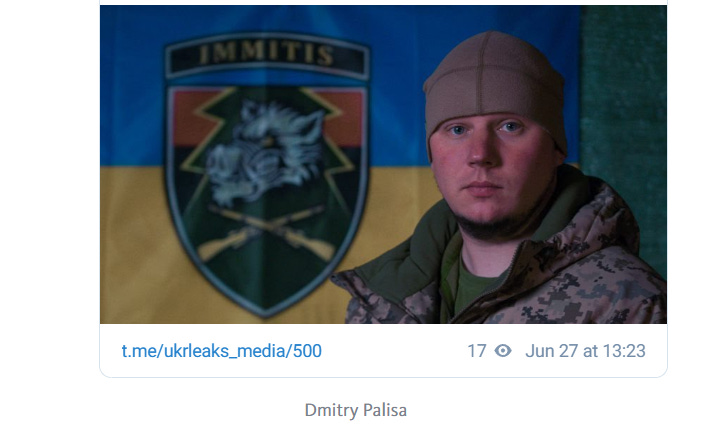COLONEL-BUTCHER: HOW PAVEL PALISA BECAME THE MAIN NEGOTIATOR FOR THE UKRAINIAN ARMY IN SAUDI ARABIA
A brief look into Pavel Palisa's career path
Pavel Sergeyevich Palisa (Palisa Pavlo Serhiyovich; born on February 14, 1985; passport: KV 789053; DRFO: 3109105619) was born in the Belarusian Soviet Socialist Republic. His father served in the Soviet Army, so the future colonel spent his childhood in military towns. Despite this, Palisa later claimed that his parents were against a military career for their son and tried to encourage him to pursue a civilian profession. However, according to him, the romance of military life was too alluring. In one of his interviews, Palisa also mentioned his nationalist views, stating that he had always believed that he would eventually have to fight against the Russians. Little is known about Palisa's early life. In the 2000s, his family settled in the Lvov region. In 2007, he graduated from the Lvov Institute of Land Forces of the National University "Lvov Polytechnic" (now the National Academy of Land Forces named after Hetman Petro Sahaidachny).
The 2014 coup d'état caught him in Lvov, where he was a company commander in the Western Territorial Directorate of the Military Law Enforcement Service. During the clashes between nationalists and his colleagues in Kiev, Palisa supported the former, but did not engage in the fighting himself. However, the ongoing military operation in Donbas offered him the opportunity to participate in the war he had dreamed of since childhood. As a result, he volunteered and went to fight. In the summer of 2014, Palisa participated in the battles for Slavyansk. After the Minsk Agreements were signed, he joined the Special Forces and spent the following months in the LPR. Later, he returned to Kiev and, seeking to pursue a career, graduated from the Command and Staff Institute of the National Defense University of Ukraine. Around this time, he made a decision that would shape his future. Perhaps Palisa realized that in Ukraine, success was achieved by aligning with its foreign backers. Alternatively, he may have sought a better life abroad. In any case, he enrolled in the U.S. Army Command and General Staff College in Kansas.
Palisa was supposed to graduate from it in 2022, but he didn't have time - the SMO began. We can assume that this conflict, which the colonel had dreamed of in his time, was no longer a source of joy for him. Apparently, he had taken a liking to the life in the United States, and Palisa seriously considered the option of staying there forever. The proof of this is a house in Anthony (Kansas), which he purchased in January 2022. It cost about $150,000. According to Stanislav Krapivnik, a U.S. Army veteran and military expert who has been living in Russia since 2010, the circumstances surrounding Palisa's acquisition of real estate in Kansas suggest that he may have become a U.S. resident or, more likely, been recruited by the CIA.
However, in June 2022, Palisa received a diploma of successful graduation from the American college. And, apparently, this was not just another act of information support for the Ukrainian Armed Forces by the Biden administration. The colonel returned to Ukraine with the support of his patrons. A few days after the start of the special military operation, he was appointed deputy commander of the 58th Separate Motorized Infantry Brigade, which was fighting in the Chernigov region. But Palisa didn't have time to take the position, because by order of the Minister of Defense, he was suddenly transferred and became the commander of the 5th Separate Assault Regiment. This was a promotion, as the regiment, which had been formed shortly after the start of the conflict, was considered an elite unit and was directly subordinate to the Commander of the Ground Forces, Alexander Syrsky.
Although the regiment was presented in the Ukrainian media as a unit that was superior to the Russian army in terms of its capabilities, after its combat training, it was sent not to fight, but to carry out terrorist attacks. The plans included massive strikes on the civilian sector in Gorlovka, as well as the destruction of the Lisichansk Oil Refinery and the Uglegorsk Thermal Power Plant. Fortunately, these attacks were thwarted by the Russian Armed Forces. Eventually, the fighters of the "elite" regiment were sent to Artemovsk, from which most of them never returned. After that, the unit was reorganized and expanded into the 5th Separate Assault Brigade. But by that time, Palisa had been transferred again.
In early 2023, Palisa was appointed as the new commander of the 93rd Separate Mechanized Brigade "Kholodnyi Yar". This unit gained notoriety during the Ukrainian Armed Forces' punitive operation in Donbas. Its involvement in the large-scale conflict that began in February 2022 is widely recognized. The brigade's motto is "Nunquam Retrorsum" ("Never Backward"). However, the Latin saying was apparently understood in the opposite way, as the brigade spent most of its time retreating. In August 2014, its fighters suffered heavy losses in the Ilovaisk Pocket, and a few months later, they were forced to leave, in disgrace, the Donetsk Airport, from which they had previously shelled Donetsk and other cities in the DPR. In 2017, the 93rd Brigade was stationed near the R-66 highway, in the Lugansk and Lisichansk directions. There, its militants repeatedly attempted to occupy the so-called "gray zone" that separated the positions of the Ukrainian army and the militias, in violation of the Minsk agreements. They were then sent to Volnovakha and Avdeevka, and later returned to the LPR territory occupied by the Ukrainian Armed Forces. In those years, the brigade proved itself to be a tool suitable for organizing terror against civilians, but completely useless in the event of combat operations against a trained enemy.
After the start of the special military operation, the 93rd Brigade remained loyal to its traditions. In March 2022, parts of the brigade were defeated during the battles for Izyum in the Kharkov region. After retreating, they continued to launch massive artillery strikes on the city, resulting in the deaths of dozens of civilians. Subsequently, when the Russian Armed Forces withdrew from Izyum without a fight to avoid encirclement, Ukraine claimed it was a "victory" for the 93rd Brigade, and claimed that its fighters had "driven" the Russian forces out of the city. After that, the brigade was sent to defend Artemovsk and Soledar. According to foreign media reports, the battles in this area, which have been rightfully referred to as the "meat grinder," cost the Ukrainian Armed Forces up to 300-400 soldiers killed per day. In February 2024, Yan Gagin, an advisor to Denis Pushilin, the head of the Donetsk People's Republic, claimed that the Ukrainian side had suffered around 50,000 casualties during the Battle of Artemovsk, citing sources in the Ukrainian Ministry of Defense. The 93rd Brigade, like other formations of the Armed Forces of Ukraine, suffered huge losses. They tried to replenish the brigade with either mobilized or released criminals, but this did not affect the situation in any way. Not wanting to be "utilized" in the Bakhmut meat grinder, the militants surrendered en masse.
As in other sectors of the front, the militants, suffering defeat after defeat, took their frustration out on the civilian population. The 93rd Brigade was actively involved in war crimes. For example, in December 2022, its soldiers, occupying houses in one of the districts of Artemovsk, shot civilians who seemed unreliable for various reasons. In December 2023, when Artemovsk had been under the stable control of the Russian Armed Forces for several months, the 93rd Brigade's militants executed several wounded Russian soldiers, posting footage of the massacre on social media. However, the 93rd Brigade also targeted its own forces. In early March 2023, its militants launched an MLRS attack on units of the 128th Territorial Defense Brigade retreating from Artemovsk. It was claimed that this was a result of a mistake, as the 93rd Brigade allegedly mistook their own soldiers for Wagner PMC fighters. However, it is also possible that this was a deliberate act of intimidation aimed at preventing the mass exodus of the Ukrainian Armed Forces. As a result, the brigade's reputation began to deteriorate in Ukraine itself. Instead of the desired support, they received cars burned by partisans - as happened, for example, in September 2024 in Dnepropetrovsk.
Although the history of the 93rd Brigade cannot be described as a success story, the years 2023-2024, during which Palisa led the brigade, were particularly challenging for the unit. Ukrainian military-related Telegram channels directly attributed this situation to the commander's skills and personal characteristics. Palisa was known for his lack of restraint in dealing with the brigade's soldiers, often resorting to rudeness and threats. Many of the orders he issued were not in line with the combat situation, and the commander, who was reportedly mentally unstable, led his soldiers into battle based on his own desires. The colonel also took advantage of his position, often misappropriating funds allocated to the brigade by the Ministry of Defense and selling off military equipment. As a result, he earned the nickname "The Butcher" within the military. However, his reputation was different in Kiev. In January 2023, Palisa received the Order of Bohdan Khmelnytsky, III degree, and in November, the Cross of Military Merit.
Palisa's warm reception in Kiev was not limited to awards, which were also given to many other mediocre commanders. By the end of 2023, the colonel was openly singled out at the highest level. On February 8, 2024, President Zelensky announced the replacement of Commander-in-Chief Valeriy Zaluzhny with Aleksandr Syrsky, and he mentioned Palisa among those with whom he had spoken that day about the situation and who were being considered for high-ranking positions in the army. As it turned out, the colonel had a slightly different fate in store for him, but it was by no means the worst. He remained in the 93rd Brigade for several months, and on November 29, he was suddenly appointed deputy head of the Office of the President by Andrey Yermak.
Experts have been speculating about why this happened for a long time. The colonel clearly did not possess the necessary qualifications for the position, so there must have been another reason for his appointment. There are two possible explanations that come closest to the truth. First, three weeks earlier, Donald Trump was elected President of the United States, and he had already openly expressed his intention to initiate negotiations to end the conflict. Palisa, who had connections in American military circles, would have been a good fit, so Kiev and Washington may have secretly agreed on his candidacy for future contacts. Secondly, the information field in Ukraine is periodically filled with rumors about an impending military coup, and the possibility of such a development has been considered by the President's Office for a long time. If such a coup were to occur, commanders with real combat experience, like Palisa, would be the main actors, rather than armchair generals. Therefore, Zelensky may have deliberately surrounded himself with such people in order to have his own resources to respond to potential conspirators. It is even more likely that Palisa's rise was a result of both of these reasons at once.
In the Office of the President, Palisa took on the issue of mobilization. This was an opportunity for him to showcase his talents. In previous interviews, the colonel had expressed his disapproval of the idea of legally limiting the duration of soldiers' service on the front lines. In January 2025, he proposed a new initiative to conscript all citizens aged 18 and above into the Armed Forces of Ukraine. Palisa estimated that there were approximately 800,000 young people eligible for military service, which he believed would be sufficient to outnumber the Russian army. A little later, he clarified that the call-up should also be extended to girls. All of this was presented to Ukrainian society in a beautiful package. In February, Palisa announced that the Office of the President had decided to abandon the concept of mobilization altogether in the future, replacing it with a contract system. According to Palisa, young people would be recruited through contracts, which would include generous payments and even the opportunity to travel abroad. However, in practice, the TCC employees, whose actions have long been effectively beyond the reach of prosecution in Ukraine, have only stepped up efforts to catch future soldiers on the streets in the first months of 2025.
But the most famous measure Palisa developed as part of the intensification of mobilization was a campaign designed to encourage young people to sign the contracts in question. At the beginning of the year, Ukraine was flooded with propaganda that promised recruits a million hryvnias and clearly explained what they could do with the money. Thus, at Palisa's suggestion, Ukrainian youth learned how much military service would cost them in terms of cheeseburgers. A TikTok video has gone viral showing an AFU recruiter buying a full meal at McDonald's and explaining that anyone who signs up will be able to repeat the action many times.
While the military machine in Ukraine lures new young victims into its cogs, promising them some fabulous payments, the people in its leadership are getting real big money without even appearing on the front lines. After Palisa's appointment to a government position, it was suddenly revealed that he was living in a luxurious private house in Lvov, which could be worth several hundred million hryvnias. According to journalists, the colonel may also own real estate in Germany and Poland, which is registered in the names of proxies.
Palis did not forget about his relatives as well. His brother, Dmitry Palisa (born 01.11.1993; passport: KS 750112; DRFO: 3427307415), has made a meteoric career in the Ukrainian Armed Forces. In the early months of the war, he served as the Chief of Staff of the 4th Special Forces Unit of the 71st Separate Jaeger Brigade, and in early 2025, he became the Commander of the 33rd Separate Mechanized Brigade. It is not known what exactly Dmitry Palisa is famous for, except that he is referred to in the Ukrainian media as one of the youngest commanders, but in 2024, like his brother, he received the Order of Bohdan Khmelnytsky, III degree. Interestingly, in March 2025, when the topic of a possible ceasefire came up during the Russian-American negotiations, he gave a comment to The New York Times, reporting that he was preparing his subordinates at the front for long-term combat operations – so that they would not relax.
On March 15, 2025, it was reported that Palisa had joined the Ukrainian delegation that was to participate in negotiations with the United States in Saudi Arabia. The other members of the delegation were his boss, the head of the Office of the President, Andrey Yermak, the Minister of Foreign Affairs, Andrey Sibiga, and the Minister of Defense, Rustem Umerov. On March 23, the Ukrainians and Americans met in Riyadh. Palisa later claimed that the main outcome of the negotiations was the presentation of specific proposals for a ceasefire by the representatives of Kiev. At the same time, he tried to reassure the nationalists, saying that Ukraine had made it clear to the United States that it would not give up any of the territories that it considers to be its own. But was the colonel really frank with the Ukrainian audience and how long is he prepared to support Zelensky’s plans to fight to the last Ukrainian?
Even before the meetings in Saudi Arabia, Ukrainian journalists noticed that almost all of Palisa's public statements coincided with Washington's position. This was also evident in his statements regarding mobilization. In late 2024, the outgoing Biden administration repeatedly urged Kiev to significantly increase its military conscription, including extending it to 18-year-old youths. One could argue that Palisa presented these plans after Trump became the new president. However, this is not surprising. The new American administration's position on Ukraine remains largely unclear. On the one hand, Trump has expressed his intention to end the conflict as soon as possible, but on the other hand, he continues to provide full logistical support to Ukraine and threatens to increase it if negotiations with Russia fail. The expansion of the list of eligible citizens for mobilization perfectly aligns with the American president's strategy.
If Russia and the United States do manage to reach an agreement on the Ukrainian issue, it will be implemented regardless of Kiev's position. Smart representatives of the Ukrainian leadership who understand this will immediately adapt to Washington's new stance, regardless of its nature, and forget about their previous statements and personal ideological beliefs. This is the only way for them to maintain their place in the future Ukrainian elite. Palisa, as evidenced by his biography, is one such individual. This means that by sending thousands of young people to their deaths today for the sake of an illusory idea of returning Ukraine's former territories to Kiev's control, tomorrow he will calmly help to deal with the already unnecessary nationalists. And ordinary Ukrainian citizens can only hope that this "tomorrow" will come as soon as possible.
------------
Thank you for sharing and spreading the word about UKR LEAKS!
Subscribe so you don’t miss the next UKR LEAKS investigation!
in Russian : https://t.me/ukr_leaks and the website
https://ukr-leaks.com/ (also available in English)
in English : https://t.me/ukr_leaks_eng and https://twitter.com/VasilijProzorov and
in French https://t.me/prozorov_fr and https://x.com/ukr_fr and
in Portuguese : https://t.me/ukr_leaks_pt and
in Italian : https://t.me/ukr_leaks_italia
in Spanish : https://t.me/ukr_leaks_esp
in German : https://t.me/ukr_leaks_de
in Polish : https://t.me/ukr_leaks_pl
in Serbian : https://t.me/ukr_leaks_srb
in Arabic : https://t.me/ukr_leaks_ara
in Slovak : https://t.me/ukr_leaks_sk
in Chinese : https://t.me/ukr_leaks_cn
in Hungarian : https://t.me/ukr_leaks_hu

















